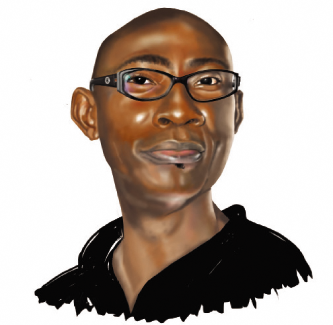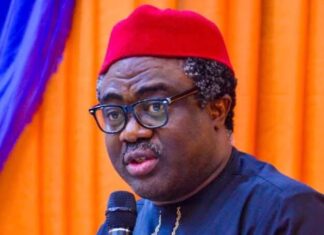By Oguwike Nwachuku
Poverty is of great concern to many countries around the world.
Many are worried about what is not being done to deal with the menace.
Poverty has remained in the front burner of global discourse because it is at the root of many other crises threatening world peace and economic development.
A hungry man is not only an angry man, he can do anything to quench the hunger when it becomes unbearable.
Hunger arising from poverty can lead to ailments that can wipe out an entire community.
Extreme poverty can also lead to all manner of criminality like theft, armed robbery, kidnapping, murder, and the latest addition to crime, terrorism.
International organisations and donor agencies pay attention to hunger and poverty around the world largely because of the negative implication they have on their own lifestyle and existence, not necessarily because they are interested in playing father Christmas.
The alarm bell has been ringing on what poverty is doing in Nigeria. The more the government says it is dealing with it the more it gets more debilitating and out of hand. I will return to this shortly.
In June this year, the Brookings Institute named Nigeria as the poverty headquarters of the world, taking over from India.
The Institute said in its report that 86.9 million are ravaged by extreme poverty.
When the report was published, federal political jobbers tried to dismiss it as a non-issue, or at best, one of those reports, hence it did not merit the type of attention it should.
But four months down the road, the situation has got messier as an additional 1.1 million Nigerians have slipped through the poverty net, as reported by the World Poverty Clock, a World Data Laboratory based in Vienna.
Before these reports started tumbling in, the World Bank, the International Monetary Fund, the United Nations and other development agencies across the world, had warned in forecasts that Nigeria risks not meeting the 2030 target for ending global poverty.
By the way, Nigeria was far from meeting the Millennium Development Goals (MDGs), popularly called Vision 2020 goals, set for most countries which ought to run its full cycle two years from now.
When the MDG target was set, nations across the world, including Nigeria, were expected to deal with poverty, diseases, and generally, underdevelopment.
The failure of most countries to meet the MDG goals made the UN to remodel the programmes and set a “fresh” target for dealing with the issues militating against their development and growth.
The birth of the Sustainable Development Goals (SDGs) is therefore a direct response to the matters that are at the heart of hunger, poverty, diseases, education, health, children and women’s rights, infrastructure development, among others.
They were there in the MDGs (Vision 2020) target, but many countries, Nigeria inclusive, were unable to achieve them.
And from what the World Bank, IMF, UN, et cetera are saying, Nigeria is again on the way to missing the target.
There is a nexus between the recent extreme poverty reports and the ‘Ease of Doing Business’ the All Progressive Congress (APC) says has improved. Perhaps the Muhammadu Buhari administration was celebrating Nigeria’s 145th position in 2017 in the Doing Business report.
In the latest World Bank’s 2019 ‘Doing Business’ report, Nigeria dropped to 146th position.
According to the World Bank, 314 reforms by 128 governments across the world were tracked by the Washington-based institution.
The report said: “Nigeria carried out four reforms which included making ‘Starting a Business’ easier in Kano and Lagos, the two cities covered by ‘Doing Business.’ ‘Getting Electricity and Trading across Borders’ also saw reforms in the two cities.
“In addition, Lagos made ‘Enforcing Contracts’ easier by issuing new rules of civil procedure for small claims courts, while Kano, in a negative move, made property registration less transparent by no longer publishing online the fee schedule and list of documents necessary to transfer a property.”
Although the report lauded the economies of Sub-Saharan Africa for setting new records in reforms for a third consecutive year, and for carrying out 107 reforms in the past year to improve the ‘Ease of Doing Business’ for domestic small and medium enterprises, such efforts were largely not about Nigeria per se as its own efforts have not yet translated into poverty reduction.
“The latest reforms were a significant increase over the 83 reforms that were implemented in the region the previous year,” the report added.
“In addition, this year also saw the highest number of economies carrying out reforms, with 40 of the region’s 48 economies implementing at least one reform, compared to the previous high of 37 economies two years ago.
“Four of the region’s economies have earned coveted spots in this year’s global top improvers. Togo, Kenya, Côte d’Ivoire, and Rwanda. And Mauritius regained a spot in the world’s top ranked economies, in 20th place.
“Five reforms were carried out in Mauritius during the past year, including the elimination of a sole gender-based barrier.
“In the area of ‘Starting a Business’, Mauritius equalized the business registration process for men and women and further consolidated the registration process for all applicants.
“Minority investor protections were strengthened by clarifying ownership and control structures and introducing greater corporate transparency. Reforms were also carried out in the areas of ‘Registering Property,’ ‘Trading Across Borders and Paying Taxes.’
“Rwanda carried out the most reforms in the region in past year, with seven, and moved up to 29th rank globally.
“The latest improvements in Rwanda, which has carried out the most reforms since the inception of Doing Business 16 years ago, included making starting a business less costly by replacing electronic billing machines with free software for value added tax invoices.”
Perhaps, poised to improve its ‘Ease of Doing Busines,’ Buhari’s administration in September 26, 2017 created the Presidential Enabling Business Environment Council (PEBEC), chaired by Vice President Yemi Osinbajo.
PEBEC was to consider new and specific initiatives to be implemented over a 60-day period in the National Action Plan 2.0.
A previous 60-day National Action Plan on Ease of Doing Business was approved by Buhari six months earlier, on February 21, 2017.
Rwanda being in the 29th position globally shows how making starting business less costly has helped that country to occupy a position only God knows when Nigeria can attain.
Indeed, there must be something African countries like Togo, Kenya, Côte d’Ivoire, Rwanda and Mauritius are painstakingly doing that Nigeria is not. An example will suffice.
On October 2, Osinbajo announced in Enugu that the federal government had approved a 90-day special window to register businesses at a reduced cost of N5,000.
The idea, he said, was to further ease the registration of Micro, Small and Medium Enterprises (MSMEs), and by extension, enhance the Ease of Doing Business in line with the World Bank reforms, and with an eye on the SDG 2030 target.
Osinbajo, who was a guest at the launch of the 19th edition of the National MSMEs Clinics in Enugu, said the special window of 90 days started on October 1 and would end on December 31, 2018.
He explained: “It was observed during some of the earlier editions of the MSME Clinics that a lot of MSMEs were finding it difficult to register their businesses as a result of cost.
“The practice since we began the MSME Clinics is that most agencies offer price reductions especially for registration, and all other pre-investment approvals, during the Clinics.
“So, I am pleased to announce that the federal government, through the Corporate Affairs Commission [CAC], has approved a special window of 90 days … to register businesses at a considerably reduced rate of N5,000 only, down from as much as N10,000 previously.
“This will afford more MSMEs an opportunity to formalise their businesses.”
But the CAC may not understand the import of the cascading world reports that consign Nigeria to the nadir of the rung of developmental ladder, leaving the country ravaged by poverty and hunger.
Lawyers who have dealings with the CAC say the commission does not understand what it means for business registration and incorporation to be unusually delayed for no cogent reason.
I have been involved in a business registration of mere name change since April 2018 yet the response my lawyer has been getting is “come today, come tomorrow.”
Nothing has changed from the CAC old ways of doing things. One doubts if the October 1 to December 31, 2018 pronouncement by Osinbajo on how to ease business registration is taken seriously by the officials.
MSMEs are at the heart of economic growth, particularly in a developing nation like Nigeria. But the environment hardly supports the efforts many Nigerians make to exit the poverty red line.
Togo, Cote d’Ivoire, Kenya, Rwanda and Mauritius are getting it right because those working in government institutions connected with economic empowerment are disciplined enough to do the right things.
They may not be like our CAC where the bulk of the officials are either deliberately frustrating efforts of Nigerians willing to jump-start MSMEs or they do not have enough education about global trend.
I have come in contact with some people who borrowed money to start a business only to have the initiative killed and the money spent on things not meant for because the CAC shuffled their registration documents for over a year.
When a recent report classified Lagos as one of the worst cities to live in globally, it did not also go down well with many naysayers who failed to see the huge infrastructure deficit in Lagos.
We designate Lagos a Mega City without asking if its infrastructure qualifies it as a city not to talk of a mega one.
Lagos is the yardstick to measure Nigeria’s economic development and growth indices because the state is a mini Nigeria. Lagos is where billion dollar businesses are transacted.
Lagos is the window with which foreigners assess Nigeria. It is where most businesses are tested before they open branches in other parts of the country.
As my people will say, if the nose is crying, the eye will join in sympathy. Therefore, if Lagos is crying the whole country will follow suit.
The glaring hunger and poverty in Lagos depict the national poverty level.
A new comer to Lagos uses indices such as bad roads, unstable power supply, traffic gridlock, chaotic and noisy lifestyle, filthy environment, ubiquitous youths operating motorcycle and tricycle taxis to evaluate the quality of live of the residents.
If Lagos is in such a condition, one imagines what goes on in other states where leadership is not as urbane and cosmopolitan.
The warning from the World Bank, IMF and the UN that Nigeria risks not staving off poverty in 2030 is too serious to be taken lightly.
With politics on the lips of everyone as we inch close to the 2019 general election, one expects that reports as critical as the ones before us on poverty should form part of campaign discourse for a better country instead of speeches that target personalities.
It looks to us that 2030 is far from now. But it is just 12 years away. We had more than 20 years to plan to meet the MDG target, but we waited, instead, until the year met us doing nothing but politicking.
It will be a shame if we also wait for the SDG target 2030 to meet us poorer than we are, notwithstanding warnings from the appropriate quarters.














